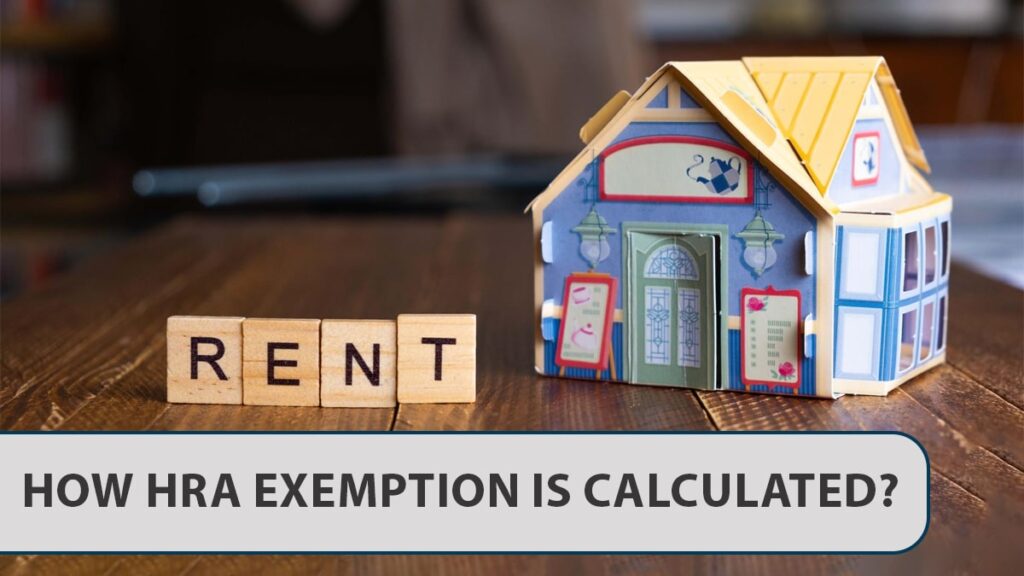HRA is a part of your salary that an employee gets from the employer as a benefit for being part of the firm. It is an Income Tax.
You can claim HRA under excerption which you can claim while filing ITR. It is completely legal to do it as per the Income Tax Act, 1961, Section 10(13A) and Rule 2A.
Every Salaried person who earns more than Rs.2.5 Lakhs is subject to taxes and he/she has to pay taxes including
HRA exemption offers a valuable opportunity to reduce taxable income which may help you in reducing the liability of paying the tax.
In this article, we will discuss how HRA Exemption is Calculated, Documents Required for HRA Exemption, etc.

What is HRA?
HRA stands for House Rent Allowance which is an employee benefit provided by the employer to the employee as part of an Employment Benefit.
It is a component of a person’s salary and is provided by an employer to help employees meet their housing-related expenses.
Inflation is a problem that puts many salaried person’s cost of living high, with these benefits, the cost of living of the individuals is shared amongst the employer and the employee receives benefits specifically aimed at this.
The amount of HRA an employee receives varies and is calculated as a percentage of the employee’s basic salary. The percentage of HRA may differ depending on the company’s policies and the cost of living in the area where the employee resides.
HRA also comes with significant tax implications and is subject to tax regulations. HRA is a significant financial benefit for employees who do not own a house and need to pay rent for their accommodation, as it helps reduce their taxable income, thus lowering their tax liability.
How Is Exemption on HRA Calculated?
House Rent Allowance (HRA) is an important component of an employee’s salary, especially for those who rent their accommodation. It provides financial assistance to help employees meet their housing expenses.
One of the significant advantages of HRA is that it can be partially or fully exempt from income tax. However, calculating the exemption can be a bit complex. To calculate the exemption on HRA, you need to consider the following factors:
- Actual HRA Received: This is the amount of HRA provided by your employer as part of your salary package.
- Actual Rent Paid: The rent you pay for your accommodation, which should be more than 10% of your salary to be considered.
- Basic Salary: This includes your basic pay, dearness allowance, and any other taxable allowance.
- City of Residence: The HRA exemption is based on the city in which you live, with different cities falling under different categories with varying percentages for exemption.
- Exemptions: The least of the following three is considered for HRA exemption:
Example-
Let’s take an example of a salary of Rs.1,00,000/- and a rented apartment costing Rs.30,000/- per month. The HRA provided by the company is Rs.30,000/-. In this case, the HRA can be calculated as follows-
- Actual HRA Received- Rs.30,000/-
- 50% of Basic Salary (For metro cities, 40% for non-metro cities)- Rs.50,000/-
- Actual Rent Paid minus 10% of Basic Salary- Rs.30,000- Rs. 10,000 = Rs.20,000/-
In this case, the least amount is Rs. 20,000. Therefore, for a monthly salary of Rs. 1 lakh, the HRA exemption would be Rs. 20,000 per month. This means that only Rs.10,000 of the total HRA received is taxable, and the remaining Rs.20,000 is exempt from income tax.
Documents Required for HRA Exemption Claim
The following are the documents required for HRA Exemption Claims-
- Copy of your PAN card
- Copy of the landlord’s PAN card
- Rent receipts for the concerned financial year
- Copy of the rent agreement
Conditions for Claiming HRA Exemption
To claim a House Rent Allowance (HRA) exemption, several conditions must be met which are as follows-
- You must be a salaried individual and receive HRA as part of your salary with a rented property for living or an apartment
- You should be paying rent to the landlord for the accommodation you occupy with proper documentation for the rent
- The HRA exemption amount varies based on the city in which you reside
- You must file your income tax returns and declare the HRA exemption to claim it officially
FAQ
Cities are categorized into metro and non-metro cities. Since metro cities have a high cost of living, metro cities get more HRA Exemption.
No, HRA exemption is typically available to salaried individuals who receive HRA as part of their salary.
No, you are not eligible for HRA exemption if you, your spouse, minor child, or Hindu Undivided Family (HUF) owns the rented accommodation.
You should maintain records such as rent receipts, the rental agreement, and any other relevant documents as proof of rent payment.
In such cases, you may provide a self-declaration and bank transactions as evidence of rent payments. However, it’s advisable to have a formal rent receipt.
Yes, you can claim an HRA exemption for the period you lived in a rented accommodation and paid rent.



